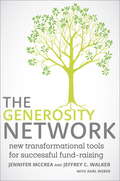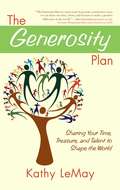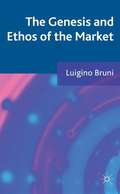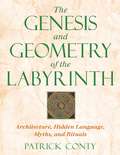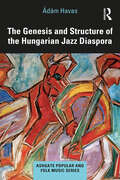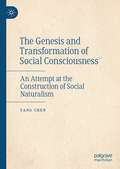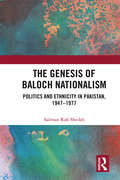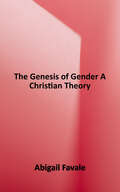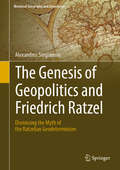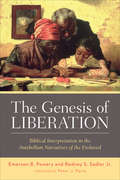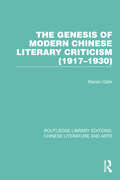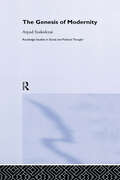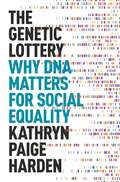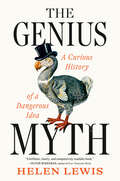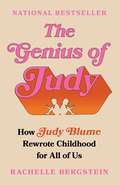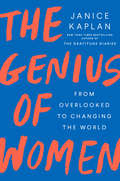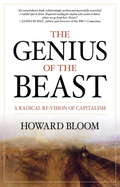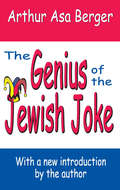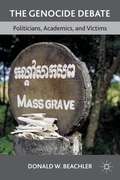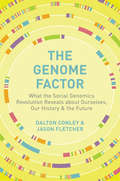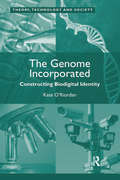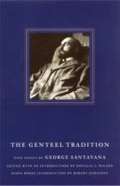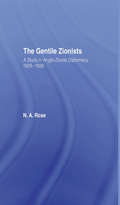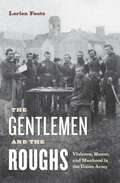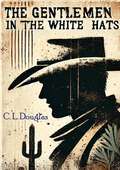- Table View
- List View
The Generosity Network
by Karl Weber Jeffrey C. Walker Jennifer MccreaThe Generosity Network is the essential guide to the art of activating resources of every kind behind any worthy cause. Philanthropist Jeff Walker and fund-raising expert Jennifer McCrea offer a fresh new perspective that can make the toughest challenges of nonprofit management and development less stressful, more rewarding--and even fun. Walker and McCrea show how traditional pre-scripted, money-centered, goal-oriented fund-raising techniques lead to anxiety and failure, while open-spirited, curiosity-driven, person-to-person connections lead to discovery, growth--and often amazing results. Through engrossing personal stories, a wealth of innovative suggestions, and inspiring examples, they show nonprofit leaders how to build a community of engaged partners who share a common passion and are eager to provide the resources needed to change the world--not just money, but also time, talents, personal networks, creative thinking, public support, and all the other forms of social capital that often seem scanty yet are really abundant, waiting to be uncovered and mobilized. Highly practical, motivating, and thought provoking, The Generosity Network is designed to energize and empower nonprofit leaders, managers, donors, board members, and other supporters. Whether you help run a multimillion-dollar global nonprofit or raise funds for a local scout troop, PTA, or other community organization, you'll learn new approaches that will make your work more successful and enjoyable than ever.From the Hardcover edition.
The Generosity Plan
by Kathy LemayMany of us have the desire to make a difference. But when it comes down to it, how many really know what steps to take and how to fit philanthropy into our lives. The Generosity Plan shows readers the unexpected benefits and joys of generosity in our daily lives. This smart, practical guide to philanthropy illuminates the power of giving by helping readers to discover what inspires them, clarify what he or she can afford to give, and direct that generosity toward a better world. Contributing time or money to causes far removed from the immediacy of our individual lives may feel overwhelming, especially in times of financial stress and uncertainty. Author Kathy LeMay breaks through these initial roadblocks to give easy and valuable tools to spur definite and rewarding action, demonstrating how our time, treasure, and talents can make a world of difference. By building and acting on a generosity plan, each one of us can create change simply by doing what we can, where we are, with what we have.
The Genesis and Ethos of the Market
by Luigino BruniA discussion of the anthropological roots of the market, tracing its development using the history of ideas and cultures as well as simple game theory. In his analysis of market ethics Bruni calls for a reconsideration of some of the central tenets of modern political economy, and the need for a new spirit of capitalism.
The Genesis and Geometry of the Labyrinth: Architecture, Hidden Language, Myths, and Rituals
by Patrick ContyA groundbreaking look at the phenomenon of the labyrinth, connecting this ancient symbol to modern scientific principles. • Illustrated with labyrinths from around the world and throughout history. • Demonstrates how the labyrinth differs from a maze and how it is a tool for interpreting ancient myths and religious beliefs. • Draws parallels between the labyrinth and quantum physics, showing how through the secrets of the labyrinth we can unlock the mystery of life itself. The powerful symbol of the labyrinth exists in countless cultures spanning the globe from Africa and ancient Greece to India, China, and pre-Colombian North and South America. For centuries they have been used for religious rituals, meditation, and spiritual and physical healing. In the labyrinth humanity finds a model of the quintessential sacred space that depicts the most profound levels of consciousness. Its center is regarded in many cultures as a door between two worlds, thus providing individuals with the ideal place for self questioning and meditation. In a comprehensive exploration of this time-honored symbol, Patrick Conty shows how the geometrical construction of the ancient labyrinth corresponds exactly with today's modern geometry, illustrating that recent developments in math and physics parallel the science of ancient civilizations. By looking at the way the two systems complement each other, Conty draws new conclusions about the ancient world and how that world can benefit us right now. Conty explores not only physical labyrinths but also reveals how the same transcendent principles are at work in Celtic knot work; the designs of ancient Chinese cauldrons; the tattoos and tracings of primitive art; the textiles of Africa, Peru, and Central America; and the geometric patterns in Islamic art.
The Genesis and Structure of the Hungarian Jazz Diaspora (Ashgate Popular and Folk Music Series)
by Ádám HavasIn Hungary, jazz was at the forefront of heated debates sparked by the racialised tensions between national music traditions and newly emerging forms of popular culture that challenged the prevailing status quo within the cultural hierarchies of different historical eras. Drawing on an extensive, four-year field research project, including ethnographic observations and 29 in-depth interviews, this book is the first to explore the hidden diasporic narrative(s) of Hungarian jazz through the system of historically formed distinctions linked to the social practices of assimilated Jews and Romani musicians. The chapters illustrate how different concepts of authenticity and conflicting definitions of jazz as the "sound of Western modernity" have resulted in a unique hierarchical setting. The book's account of the fundamental opposition between US-centric mainstream jazz (bebop) and Bartók-inspired free jazz camps not only reveals the extent to which traditionalism and modernism were linked to class- and race-based cultural distinctions, but offers critical insights about the social logic of Hungary’s geocultural positioning in the ‘twilight zone’ between East and West to use the words of Maria Todorova. Following a historical overview that incorporates comparisons with other Central European jazz cultures, the book offers a rigorous analysis of how the transition from playing ‘caféhouse music’ to bebop became a significant element in the status claims of Hungary’s ‘significant others’, i.e. Romani musicians. By combining the innovative application of Pierre Bourdieu’s cultural sociology with popular music studies and postcolonial scholarship, this work offers a forceful demonstration of the manifold connections of this particular jazz scene to global networks of cultural production, which also continue to shape it.
The Genesis and Transformation of Social Consciousness: An Attempt at the Construction of Social Naturalism
by Yang ChenThis book focuses on the formation of human social consciousness and develops a naturalist approach to social normativity. Beginning from Marx's uncompleted concept of social consciousness, the book retrospects the studies about collective intentionality in the area of philosophy of mind and social ontology. Specifically, a reinterpretation of social consciousness with respect to collective intentionality can offer us a new, naturalistic approach to the social formation and normativity. According to the naturalistic approach, we can discern the inner structure of social consciousness as a systematic pattern of Intentionality. Social consciousness involves three levels of development: subjective, objective and absolute. With this new pattern of social consciousness, the “naturalism” of the young Karl Marx can be revived. And by grasping the most essential ability of human Intentionality as the source of social formation, it also makes an interdisciplinary study of social philosophyand philosophy of mind possible.
The Genesis of Baloch Nationalism: Politics and Ethnicity in Pakistan, 1947–1977
by Salman Rafi SheikhThis book explores the ideological, political and military interventions of the state of Pakistan in Balochistan and traces the genesis of today’s secessionist movement. It delves into the historical question of Balochistan’s integration into Pakistan in 1947 and brings out the true political and militant character of the movement during the first three decades (1947–77) of Pakistan’s existence as a nation-state. It shows how the Baloch, as well as other minority groups, were denied the right to identify themselves as a sub-national/ethnic group in the new nation-state, compounded by a systematic exclusion from decision-making circles and structures of political and economic power. The volume also traces political resistance from within Balochistan and its subsequent suppression by military operations, leading to a widespread militant insurgency in the present day. Drawing on hitherto unexplored sources, this book will be indispensable to scholars and researchers of South Asian history, politics, international relations and area studies.
The Genesis of Gender: A Christian Theory
by Abigail FavaleThe question of gender—who we are as men and women—has never been more pressing, or more misunderstood. <p><p> Weaving personal experience with expert knowledge, Dr. Abigail Favale provides an in-depth yet accessible account of the gender paradigm: a framework for understanding reality and identity that has recently risen to prominence. Favale traces the genealogy of gender to its origins in feminism and postmodern thought, describing how gender has come to eclipse sex, and how that shift is reshaping language, law, medicine, sexuality, and our own self-perceptions. <p><p> With substance, clarity, and compassion, Favale teases out the hidden assumptions of the gender paradigm and exposes its effects. Yet this book is not merely an exposé—it is also a powerful, moving articulation of a Christian understanding of reality: a holistic paradigm that proclaims the dignity of the body, the sacramental meaning of sexual difference, and the interconnectedness of all creation. The Genesis of Gender is a vital, timely resource for anyone seeking to better understand the gender paradigm—and how to live beyond it.
The Genesis of Geopolitics and Friedrich Ratzel: Dismissing The Myth Of The Ratzelian Geodeterminism (Historical Geography and Geosciences)
by Alexandros StogiannosThis book discusses the influence of Friedrich Ratzel's ideas in more contemporary geopolitical analytical systems and the geodeterminism commonly attributed to him. The author thoroughly analyzes the structural components of Ratzel's thought. The research is inspired by the numerous contradictory approaches in the secondary literature, presenting Ratzel as both humanist and racist, geo-determinist and multidimensional analyst, organicist and social scientist, precursor of Geopolitics and opponent to the same idea. In this work, more particular issues are approached: the establishment of a scientific Political Geography; the methodological approach of his multidisciplinary work; the redefinition of his geopolitical period; his notion of state and the evaluation of sociological and cultural parameters as factors of state power; the biogeographical content of the notion of Lebensraum; his attitude towards the racist theories as well as towards the Darwinian theories; his overall worldview and the confrontation with cosmopolitism; his contribution to an interdisciplinary, positivist and scientific approach in analyzing social and international affairs; his thoughts on the architecture of Europe. The book will be useful for researchers and students in many scientific fields, such as International Relations, Geopolitics, Geography and History of Geography.
The Genesis of Liberation: Biblical Interpretation In The Antebellum Narratives Of The Enslaved
by Emerson B. Powery Rodney S. Sadler Jr.Considering that the Bible was used to justify and perpetuate African American enslavement, why would it be given such authority? In this fascinating volume, Powery and Sadler explore how the Bible became a source of liberation for enslaved African Americans by analyzing its function in pre-Civil War freedom narratives. They explain the various ways in which enslaved African Americans interpreted the Bible and used it as a source for hope, empowerment, and literacy. The authors show that through their own engagement with the biblical text, enslaved African Americans found a liberating word. The Genesis of Liberation recovers the early history of black biblical interpretation and will help to expand understandings of African American hermeneutics.
The Genesis of Modern Chinese Literary Criticism (Routledge Library Editions: Chinese Literature and Arts #15)
by Marián GálikThis book, first published in 1980, is a history of modern Chinese literary criticism between the years 1917 and 1930. It examines its development within the overall frame of reference of Chinese national literature from the beginnings of the Chinese literary revolution in 1917 until the end of the first efforts at a revolutionary proletarian literature in 1930. Chinese literary criticism is also analysed within the framework of world literature, of world literary thought, especially of the impact of the progressive literary criticism.
The Genesis of Modernity (Routledge Studies in Social and Political Thought #36)
by Arpad SzakolczaiThe Genesis of Modernity reconstructs the ideas of three of the most important social and political theorists of the Twentieth Century, Max Weber, Michel Foucault and Eric Voegelin, on the distant roots and sources of modernity.Drawing upon the conceptual tools of social theory and political philosophy, complimented by approaches based in the fields of anthropology, comparative mythology and the history of ancient philosophy this book will prove to be a timely and valuable contribution to this developing area, bringing together the ideas of a group of social and political theorists whose work so far has remained largely unconnected.This book will be essential reading for academics and advanced students concerned with social theory, political theory, sociology, history and philosophy.
The Genetic Lottery: Why DNA Matters for Social Equality
by Kathryn Paige HardenA provocative and timely case for how the science of genetics can help create a more just and equal societyIn recent years, scientists like Kathryn Paige Harden have shown that DNA makes us different, in our personalities and in our health—and in ways that matter for educational and economic success in our current society.In The Genetic Lottery, Harden introduces readers to the latest genetic science, dismantling dangerous ideas about racial superiority and challenging us to grapple with what equality really means in a world where people are born different. Weaving together personal stories with scientific evidence, Harden shows why our refusal to recognize the power of DNA perpetuates the myth of meritocracy, and argues that we must acknowledge the role of genetic luck if we are ever to create a fair society.Reclaiming genetic science from the legacy of eugenics, this groundbreaking book offers a bold new vision of society where everyone thrives, regardless of how one fares in the genetic lottery.
The Genius Myth: A Curious History of a Dangerous Idea
by Helen LewisFrom acclaimed Atlantic staff writer and host of BBC&’s podcast &“The New Gurus&” Helen Lewis comes a timely and provocative interrogation of the myth of genius, exploring the surprising inventions, inspirations and distortions by which some lives are elevated to 'greatness' - and others are not*A Guardian, Financial Times, New Statesman and GQ Book for 2025*You can tell what a society values by who it labels as a genius. You can also tell who it excludes, who it enables, and what it is prepared to tolerate. In The Genius Myth, Helen Lewis unearths how this one word has shaped (and distorted) our ideas of success and achievement.Ultimately, argues Lewis, the modern idea of genius — a single preternaturally gifted individual, usually white and male, exempt from social niceties and sometimes even the law— has run its course. Braiding deep research with her signature wit and lightness, Lewis dissects past and present models of genius in the West, and reveals a far deeper and more interesting picture of human creativity than conventional wisdom allows. She uncovers a battalion of overlooked wives and collaborators. She asks whether most inventions are inevitable. She wonders if the Beatles would succeed today. And she confronts the vexing puzzle of Elon Musk, the tech disrupter who fancies himself as an ubermensch.Smart, funny, and provocative, The Genius Myth will challenge your assumptions about creativity, productivity, and innovation --- and forever alter your mental image of the so-called &“genius.&”
The Genius of Judy: How Judy Blume Rewrote Childhood for All of Us
by Rachelle BergsteinNATIONAL BESTSELLER An intimate and expansive look at Judy Blume&’s life, work, and cultural impact, focusing on her most iconic—and controversial—young adult novels, from Are You There God? It&’s Me, Margaret. to Blubber.Everyone knows Judy Blume. Her books have garnered her fans of all ages for decades and sold tens of millions of copies. But why were people so drawn to them? And why are we still talking about them now in the 21st century? In The Genius of Judy, her remarkable story is revealed as never before, beginning with her as a mother of two searching for purpose outside of her home in 1960s suburban New Jersey. The books she wrote starred regular children with genuine thoughts and problems. But behind those deceptively simple tales, Blume explored the pillars of the growing women&’s rights movement, in which girls and women were entitled to careers, bodily autonomy, fulfilling relationships, and even sexual pleasure. Blume wasn&’t trying to be a revolutionary—she just wanted to tell honest stories—but in doing so, she created a cohesive, culture-altering vision of modern adolescence. Blume&’s bravery provoked backlash, making her the country&’s most-banned author in the mid-1980s. Thankfully, her works withstood those culture wars and it&’s no coincidence that Blume has resurfaced as a cultural touchstone now. Young girls are still cat-called, sex education curricula are getting dismissed as pornography, and entire shelves of libraries are being banned. As we face these challenges, it&’s only natural we look to Blume, the grand dame of so-called dirty books. This is the story of how a housewife became a groundbreaking artist, and how generations of empowered fans are her legacy, today more than ever.
The Genius of Women: From Overlooked to Changing the World
by Janice KaplanWe tell girls that they can be anything, so why do 90 percent of Americans believe that geniuses are almost always men? New York Times bestselling journalist Janice Kaplan explores the powerful forces that have rigged the system—and celebrates the women geniuses past and present who have triumphed anyway. Even in this time of rethinking women&’s roles, we define genius almost exclusively through male achievement. When asked to name a genius, people mention Albert Einstein, Leonardo da Vinci, and Steve Jobs. As for great women? In one survey, the only female genius anyone listed was Marie Curie. Janice Kaplan, the New York Times bestselling author of The Gratitude Diaries, set out to determine why the extraordinary work of so many women has been brushed aside. Using her unique mix of memoir, narrative, and inspiration, she makes surprising discoveries about women geniuses now and throughout history, in fields from music to robotics. Through interviews with neuroscientists, psychologists, and dozens of women geniuses at work in the world today—including Nobel Prize winner Frances Arnold and AI expert Fei-Fei Li—she proves that genius isn't just about talent. It's about having that talent recognized, nurtured, and celebrated. Across the generations, even when they face less-than-perfect circumstances, women geniuses have created brilliant and original work. In The Genius of Women, you&’ll learn how they ignored obstacles and broke down seemingly unshakable barriers. The geniuses in this moving, powerful, and very entertaining book provide more than inspiration—they offer a clear blueprint to everyone who wants to find her own path and move forward with passion.
The Genius of the Beast: A Radical Re-vision of Capitalism
by Howard BloomIs global capitalism on its last legs? Is the era of American leadership over? Has the West begun a decline into a new Dark Age? Does American civilization deserve to survive? These are the unnerving questions raised by the Great Crash of 2009. This book resents a radically new answer, insisting that global society has only begun to realize its full potential. Bloom argues that there's a hidden mandate beneath the surface of capitalism: "It's struggling to whisper and rumble its message to you and me. That hidden imperative can lift us from economic crisis, can make us a leader in the next-generation economy, and can dramatically upgrade our ability to empower our fellow human beings." Bloom sees crisis as opportunity, opportunity for the whole human race. In more than eighty short, fast chapters, insights appear suddenly, like the quick bursts of flashbulbs, taking the reader on a sweeping tour of human history, from the Stone Age to the present. Every chapter conveys a radically new way to see the astonishing mechanism we call "Western Civilization." Author Howard Bloom marvels at how humans have turned toxic waste into food and fuel, trash into treasure, and garbage into gold. He shows how we've produced material miracles based on immaterial things--passion, persistence, and fantasy. He shows that what many regard as the end is just the beginning. The beginning of something you've never before imagined. The author explains why the secret to capitalism's next great leap does not lie in new financial tricks, but in tapping things right under our noses in radically new ways--that is, tapping our imagination, our desire to feel useful, our desire to help others, and our desire to be recognized for contributing to the welfare of humanity. The key to next-generation capitalism lies in a big-picture view that's utterly unlike anything you've previously perceived. A big-picture view that will startle you. A big-picture view with which you can ignite the world, get a new handle on your life, and help transform society. This brilliant, inspirational work of daring ideas and breath-taking research offers more than hope. It offers unseen levels of understanding. Understanding that can literally redefine what it means to be a human being.
The Genius of the Jewish Joke
by Arthur Asa BergerThe Genius of the Jewish Joke focuses on what is distinctive and unusual about Jewish jokes and Jewish humor. Jewish humor is humor by Jews and about Jews, in whatever medium this humor is found. Jokes are defined as short stories, meant to amuse, with a punch line, though Jewish humor exists in many other forms—riddles, comic definitions, parodies—as well. The book makes a "radical" suggestion about the origin of Jewish humor—namely, that Sarah and Abraham's relation to God, and the name of their son Isaac (which, in Hebrew, means laughter), recognizes a special affinity in Jews for humor. Abraham does not sacrifice Isaac (humor) and, thus, humor and the Jews are linked early in Jewish history.Berger discusses techniques of humor and how they can be used to analyze jokes. He also compares "Old World Jewish Humor"—the humor of the shtetl, with its fabulous schlemiels, schlimazels, schnorrers, and other characters—and "New World Humor"—the humor of Jewish doctors, lawyers, accountants, and other professional types living mostly in the suburbs nowadays. Jewish humor is contrasted with other forms of ethnic humor, such as Polish jokes and Italian American jokes.This humor, in addition to providing pleasure, reveals a great deal about Jewish character and culture and, in addition, the human condition. Now available with a new introduction by the author, The Genius of the Jewish Joke is an entertaining and informative inquiry into Jewish humor that explores its distinctiveness, its unique spirit, and its role in Jewish identity.
The Genocide Debate
by Donald W. BeachlerNeither a case study of a particular genocide nor a work of comparative genocide, this book explores the political constraints and imperatives that motivate debates about genocide in the academic world and, to a lesser extent, in the political arena. The book is an analysis of the ways that political interests shape discourse about genocide.
The Genome Factor: What the Social Genomics Revolution Reveals about Ourselves, Our History, and the Future
by Dalton Conley Jason FletcherFor a century, social scientists have avoided genetics like the plague. But the nature-nurture wars are over. In the past decade, a small but intrepid group of economists, political scientists, and sociologists have harnessed the genomics revolution to paint a more complete picture of human social life than ever before. The Genome Factor describes the latest astonishing discoveries being made at the scientific frontier where genomics and the social sciences intersect.The Genome Factor reveals that there are real genetic differences by racial ancestry—but ones that don't conform to what we call black, white, or Latino. Genes explain a significant share of who gets ahead in society and who does not, but instead of giving rise to a genotocracy, genes often act as engines of mobility that counter social disadvantage. An increasing number of us are marrying partners with similar education levels as ourselves, but genetically speaking, humans are mixing it up more than ever before with respect to mating and reproduction. These are just a few of the many findings presented in this illuminating and entertaining book, which also tackles controversial topics such as genetically personalized education and the future of reproduction in a world where more and more of us are taking advantage of cheap genotyping services like 23andMe to find out what our genes may hold in store for ourselves and our children.The Genome Factor shows how genomics is transforming the social sciences—and how social scientists are integrating both nature and nurture into a unified, comprehensive understanding of human behavior at both the individual and society-wide levels.
The Genome Incorporated: Constructing Biodigital Identity (Theory, Technology and Society)
by Kate O'RiordanThe Genome Incorporated examines the proliferation of human genomics across contemporary media cultures. It explores questions about what it means for a technoscience to thoroughly saturate everyday life, and places the interrogation of the science/media relationship at the heart of this enquiry. The book develops a number of case studies in the mediation and consumption of genomics, including: the emergence of new direct-to-the-consumer bioinformatics companies; the mundane propagation of testing and genetic information through lifestyle television programming; and public and private engagements with art and science institutions and events. Through these novel sites, this book examines the proliferating circuits of production and consumption of genetic information and theorizes this as a process of incorporation. Its wide-ranging case studies ensure its appeal to readers across the social sciences.
The Genteel Tradition: Nine Essays
by George SantayanaThe nine essays are: Young Sammy's first wild oats, The genteel tradition in American philosophy, Shakespeare: made in America, Genteel American poetry, The moral background, Philosophical opinion in America, Materialism and idealism in America, Marginal notes on civilization in the United States, and The genteel tradition at bay. Includes bibliographical references and index.
The Gentile Zionists: A Study in Anglo-Zionist Diplomacy 1929-1939
by N.A. RoseFirst Published in 1973. Routledge is an imprint of Taylor & Francis, an informa company.
The Gentlemen and the Roughs: Violence, Honor, and Manhood in the Union Army
by Lorien Foote&“A seminal work&” on class divisions within the Union Army—&“One of the best examples of . . . scholarship on the social history of Civil War soldiers&” (The Journal of Southern History). During the Civil War, the Union army appeared cohesive enough to withstand four years of grueling war against the Confederates and to claim victory in 1865. But fractiousness bubbled below the surface of the North&’s presumably united front. Internal fissures were rife within the Union army: class divisions, regional antagonisms, ideological differences, and conflicting personalities all distracted the army from quelling the Southern rebellion. In this highly original contribution to Civil War and gender history, Lorien Foote reveals that these internal battles were fought against the backdrop of manhood. Clashing ideals of manliness produced myriad conflicts, as when educated, refined, and wealthy officers (&“gentlemen&”) found themselves commanding a hard-drinking group of fighters (&“roughs&”)—a dynamic that often resulted in violence and even death. Based on extensive research into previously ignored primary sources, The Gentlemen and the Roughs uncovers holes in our understanding of the men who fought the Civil War and the society that produced them. Finalist for the 2011 Gilder Lehrman Lincoln Prize
The Gentlemen in the White Hats: Dramatic Episodes in the History of the Texas Rangers
by C. L. DouglasThe Gentlemen in the White Hats by C. L. Douglas is a thrilling and richly detailed exploration of the legendary Texas Rangers, one of the most iconic law enforcement organizations in American history. Through vivid storytelling and meticulous research, Douglas brings to life the dramatic episodes, fearless characters, and enduring legacy of the Rangers, whose exploits have become the stuff of myth and folklore.From their formation in the early 19th century to their role in taming the lawless frontier, the Texas Rangers are portrayed as both protectors and warriors, navigating the complex and often violent challenges of the American Southwest. Douglas recounts their daring confrontations with outlaws, cattle rustlers, and renegades, as well as their involvement in pivotal historical moments, such as the battles along the U.S.-Mexico border and the fight against notorious criminals.The book highlights the colorful personalities of individual Rangers, whose bravery and resourcefulness epitomized the rugged spirit of the frontier. At the same time, Douglas offers a balanced perspective, addressing the controversies and challenges the Rangers faced, including their methods and the evolving nature of their role in a rapidly changing society.Rich with action, historical context, and larger-than-life characters, The Gentlemen in the White Hats captures the essence of the Texas Rangers as symbols of justice, resilience, and the enduring spirit of the American West. Douglas’s engaging prose and attention to detail make this a must-read for history enthusiasts, fans of Western lore, and anyone fascinated by the intersection of fact and legend in the shaping of American history.Perfect for readers who appreciate gripping tales of adventure and historical significance, this book offers an unforgettable journey into the dramatic and often dangerous world of the Texas Rangers.
